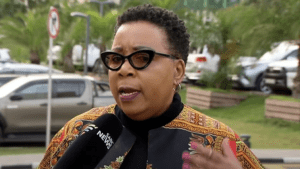Former South African president Jacob Zuma and his party, uMkhonto weSizwe (MK), have claimed they were wrongfully defeated in the 2024 general elections due to widespread vote-rigging. Zuma alleges that more than nine million votes intended for the MK Party were not counted, significantly altering the election outcome.
At a recent rally in Vosloorus, Zuma revealed what he called “shocking” evidence of electoral fraud, announcing the MK Party’s plans to re-file a legal challenge against the results. “Our initial withdrawal of the case was not the end of the matter. We stepped back to gather more evidence, and what we found has left us stunned,” Zuma said.
The Independent Electoral Commission (IEC) has dismissed these claims, maintaining that the elections were free and fair. The MK Party’s first legal challenge was withdrawn due to insufficient evidence, with court filings only including an unsigned IT forensic report. However, Zuma has vowed to escalate the matter to international courts if South African judicial bodies reject their case. He expressed confidence that legal action could expedite the MK Party’s rise to power.
“We must win this case because it could mean taking control of Pretoria immediately. Don’t assume this will take years—it could happen sooner than you think,” Zuma declared.
The MK Party, formed after Zuma’s presidency, emerged as South Africa’s third-largest party in the 2024 elections, securing 58 parliamentary seats and 14.58% of the vote. The African National Congress (ANC) lost its majority for the first time since apartheid, intensifying political tensions amid Zuma’s allegations.
Meanwhile, Economic Freedom Fighters (EFF) leader Julius Malema has publicly criticized Zuma, ruling out any potential alliance between the two parties. Malema accused Zuma of exploiting racial divisions and labeled him as untrustworthy.
As the MK Party prepares to present its evidence in court, South Africa awaits developments that could dramatically reshape its political landscape.






















